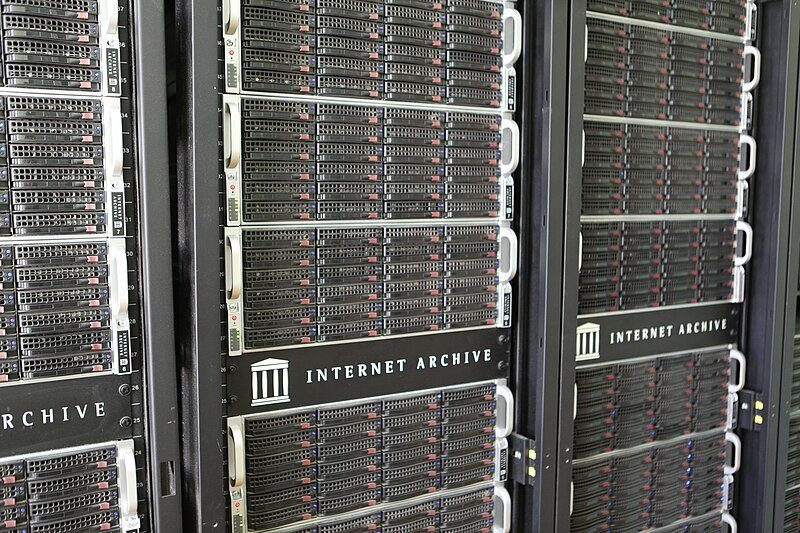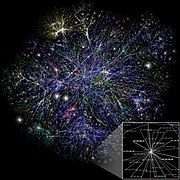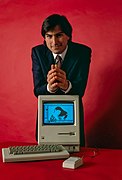The Internet PortalThe Internet (or internet) is the global system of interconnected computer networks that uses the Internet protocol suite (TCP/IP) to communicate between networks and devices. It is a network of networks that consists of private, public, academic, business, and government networks of local to global scope, linked by a broad array of electronic, wireless, and optical networking technologies. The Internet carries a vast range of information resources and services, such as the interlinked hypertext documents and applications of the World Wide Web (WWW), electronic mail, telephony, and file sharing. The origins of the Internet date back to research to enable time-sharing of computer resources and the development of packet switching in the 1960s. The set of rules (communication protocols) to enable internetworking on the Internet arose from research and development commissioned in the 1970s by the Defense Advanced Research Projects Agency (DARPA) of the United States Department of Defense in collaboration with universities and researchers across the United States and in the United Kingdom and France. The ARPANET initially served as a backbone for the interconnection of regional academic and military networks in the United States to enable resource sharing. The funding of the National Science Foundation Network as a new backbone in the 1980s, as well as private funding for other commercial extensions, encouraged worldwide participation in the development of new networking technologies and the merger of many networks using DARPA's Internet protocol suite. The linking of commercial networks and enterprises by the early 1990s, as well as the advent of the World Wide Web, marked the beginning of the transition to the modern Internet, and generated a sustained exponential growth as generations of institutional, personal, and mobile computers were connected to the network. Although the Internet was widely used by academia in the 1980s, the subsequent commercialization in the 1990s and beyond incorporated its services and technologies into virtually every aspect of modern life. (Full article...) Selected article
Opera is a web browser and Internet suite developed by the Opera Software company. Opera handles common Internet-related tasks such as displaying web sites, sending and receiving e-mail messages, managing contacts, IRC online chatting, downloading files via BitTorrent, and reading web feeds. Opera is offered free of charge for personal computers and mobile phones, but for other devices it must be paid for. Features of Opera include high performance, tabbed browsing, page zooming, mouse gestures, and an integrated download manager. Its security features include built-in phishing protection, strong encryption when browsing secure web sites, and the ability to delete private data such as cookies and browsing history by clicking a button. Opera runs on a variety of personal computer operating systems, including Microsoft Windows, Mac OS X, Linux, FreeBSD, and Solaris. Although evaluations of Opera have been largely positive, Opera has had limited success on personal computers. It is currently the fourth most widely used web browser for personal computers, behind Internet Explorer, Mozilla Firefox, and Safari. Opera has a stronger market share, however, on mobile devices such as mobile phones, smartphones, and personal digital assistants.
Selected picture A wireless LAN or WLAN is a wireless local area network, which is the linking of two or more computers without using wires. WLAN utilizes spread-spectrum or OFDM modulation technology based on radio waves to enable communication between devices in a limited area, also known as the basic service set. This gives users the mobility to move around within a broad coverage area and still be connected to the network. News
Wikinews Internet portal
WikiProjects
Did you know (auto-generated) -
Selected biographyLeonard Kleinrock (born June 13, 1934 in New York) is a computer scientist, and a professor of computer science at UCLA, who made several important contributions to the field of computer networking, in particular to the theoretical side of computer networking. He also played an important role in the development of the ARPANET at UCLA. His most well-known and significant work is his early work on queueing theory, which has applications in many fields, among them as a key mathematical background to packet switching, the basic technology behind the Internet. His initial contribution to this field was his doctoral thesis in 1962, published in book form in 1964; he later published several of the standard works on the subject. His theoretical work on hierarchical routing, done in the late 1970s with his then-student Farouk Kamoun, is now critical to the operation of today's world-wide Internet. General images -The following are images from various internet-related articles on Wikipedia.
Selected quoteMore Did you know...
Main topics
Featured contentCategoriesRelated portalsThings you can do
Associated WikimediaThe following Wikimedia Foundation sister projects provide more on this subject:
Wikipedia's portals |



















































